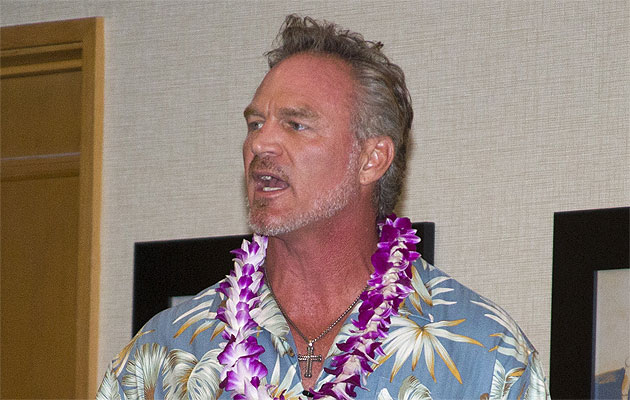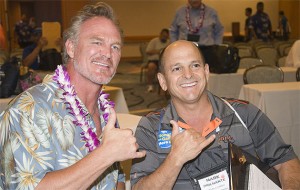
This is an extended version of a story about former Oklahoma and Seattle Seahawks linebacker Brian Bosworth that ran in the Wednesday edition of the Honolulu Star-Advertiser.
Brian Bosworth was an electric football player with a flamboyant personality and a colorful haircut to match.
The emphasis of the last sentence is on “was.”
As “The Boz,” Bosworth was a consensus All-American at Oklahoma in 1985 and ’86, but to some, he was a consensus nutcase who called attention to himself, spoke out against the NCAA and was banned from a bowl game because of a positive test for steroids.
These days, instead of narcissism, the 50-year-old Bosworth has God, Jesus and the Holy Spirit, and he told a gathering of athletic directors and coaches at the Hawaii Interscholastic Athletic Association’s annual conference on Tuesday that he is blessed and that “nothing else filled the void” of 24 years of anger (from 1990, when he retired from the Seattle Sehawks due to a shoulder injury, to 2013, when he was asked to read a Christian movie script and ended up taking the part and finding himself).
“Who is the Boz? It took me 47 years to understand,” he said. “I am blessed to be able to find peace and understand. I used to think it was all about me. I wanted to control all things happening to me. Ego, pride set the ton of my life.”
After telling his life story through the lens of his new-found strength, Bosworth wanted the HIADA attendees to know that what they’re doing — guiding young people — is admirable because it helps them find their way in life. He talked about how coaches and administrators in his past succeeded in challenging him to become a better person, even though he continued to have his struggles.
“(That’s how) important you are in the lives of other people,” Bosworth said. “All of those years of sacrifices, we know you didn’t do it for the glory, because if you did, this room would be empty. There is something inside of you that tells you that this is what you have been called to do. You are a bunch of guiders, mentors that love and care about athletes … and how they interact with each other and engage in normal society and (have an impact) on how they perceive themselves.”
Bosworth spoke for more than an hour and signed autographs and posed for pictures with the ADs, coaches and others afterward.

He also challenged everybody in attendance to ask themselves two questions when they wake up every morning, and, of course, the message can now easily be passed on to Hawaii’s athletes.
“Do you want to enhance the world or destroy it? Do you want to help or hurt?”
Bosworth talked about his days before college football stardom.
“I was the disruptive kid in class,” he said. “I was the toughest kid in first grade, second grade, third grade, fourth grade, fifth grade and sixth grade. I was not motivated to do well in school.”
When he was preparing to go out for junior high football, the coach told him that he was not going to be on the team because of his character issues.
“I was scared to death,” Bosworth said. “I had to tell my dad I could not play on the team and that I wasn’t invited. … Most importantly, I didn’t want to disappoint him.”
He said a prayer for the first time and a few days later asked the coach for a chance to play and improve his character.
“He agreed and I made the honor roll and was an honor student from then on (until high school). I had a purpose,” he added.
“I understand the impact of what you guys do,” he told the athletic directors. “The tenacity of the assistant coaches and athletic directors in junior high, high school, college, they were never my friends and never pretended to be my friends, but I wanted to do everything I could to make them happy.”
In college, coach Barry Switzer had a profound impact on Bosworth.
“My grandfather planted the seed at a young age, saying, “I want you to play for the Oklahoma Sooners,” Bosworth said. “From that moment on, everything I did was with ‘How do I get from here to there’ in mind.
“Coach Switzer, when he was recruiting me took me into his office and told me, ‘You can be the best athlete Oklahoma has had since I’ve been here. He probably told that to a lot of people, but I believed it. When we beat Texas 14-7 in my sophomore year, after the game, he said, ‘Brian Bosworth is the best linebacker in the nation.’ What he told me in his office came true in the two years I was there. It was a blessing and a curse. That’s when the Boz took over.”
Bosworth recalls his post-retirement years as a “journey through darkness.”
“My body was in severe and intense pain,” he said. “I did not know how to love. I had nothing to live for. I didn’t have anything real, of substance. I had shiny cars and had built a house in Malibu, but there is nothing there of value at all. Nothing filled the void.”
An agent offered a recently divorced Bosworth — who has been an actor since 1991 — a movie script in 2012, and he was going to turn it down.
“I’m not interested,” he said he told the agent. “He kept telling me to read the script. I had no desire or passion to. I told him, ‘I quit.’ For an athlete to say ‘I quit’ is about the lowest you can go. But this guy was so persistent, so I said, ‘Fine, I’ll read the script. He sent it to me and after 15-20 pages, I thought he had sent me the wrong script. The first scene was about a guy bashing somebody in the head with a hammer.”
Bosworth eventually read the whole script and saw himself in the part he was reading for.
“I started to cry because for the first time I saw in black and white a mean, spiteful, bitter human being that hated what God did for him, to him and all the creatures around him. That was my journey. Why had this been given to me at the lowest point in my life? I tried to talk myself out of taking the part.
“The movie is about the rapture (in some Christian religions, it’s when believers meet Jesus and go to heaven and nonbelievers do not).”
Bosworth attended a showing of the movie in the place he calls home, Oklahoma.
“I told my pastor that I was lost and unhappy, confused,” Bosworth said. “He asked me, ‘Do you want it to end?’ I told him that I wanted to go home, but I didn’t know how.
“On March 3, 2013, I gave my life to Christ and my life changed immediately. Since then, I’ve gone from darkness to the colors of the rainbow. Life has purpose. I have awareness of where I’m going.”
COMMENTS